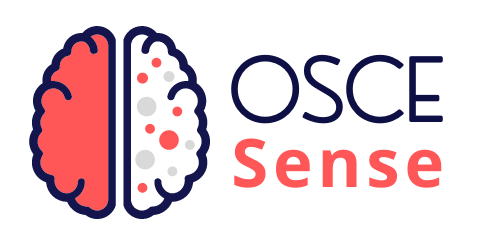Frequently Asked Questions
What are these stations for?
The aim is to make clinical OSCEs easier to revise for. OSCE Sense stations focus on compound tasks. We have found this is the best way to prepare for clinical OSCEs, far better than practicing individual tasks in isolation. For example, instead of giving you a straight cardiovascular exam, an OSCE Sense station will give you a CV exam followed by other related tasks such as results interpretation, and patient discussion. The aim is to provide you with a training tool that tests not only your basic technique but also your ability to clinically reason and think on your feet in an exam situation. We hope this will not only help you prepare for your exams, but also for life as a junior doctor.
How do I use the stations?
The stations have been designed for use in small groups. Ideally, 3 people (1 marker, 1 patient actor, and 1 candidate/student) but we have also designed the stations to be accessible for groups of 2.
Each case finishes with a summary and it’s important to debrief.
TOP TIP : A little educational birdie once told us the biggest mistake medical students make is revising with 1 single group. This means you all pick up each others bad habits without even realising. This is so prevalent that some examiners claim to be able to pick out which students have revised together. One of the best ways to avoid this is to revise with different groups of peers and making sure to debrief properly after each station.
The 3 steps of station Feedback
Self assessment - allow the student sitting the station to self assess and reflect on any mistakes.
What went well (examiner feedback) - for your own learning try to identify parts of the candidates exam technique that made you feel like they confidently knew what they were doing. Next time you do a station try to emulate this. Particularly pay attention to how they question/reassure/palpate/auscultate/move/observe patients.
What went not so well (examiner feedback) -
Give the OBJECTIVE points that could be improved - which checklist items did they miss e.g. you forgot to ask smoking history in a respiratory patient.
Give the SUBJECTIVE points that could be improved - could they have improved their exam technique or approach e.g. you could have watched the patients face when palpating for abdominal pain… or… you could have asked more open ended questions before singling in on specific symptoms.
The Scoring System
We have included a scoring system for each station. This should give you an objective idea of how you’re performing. Gaining subjective feedback from your peers is also an important part of improving your global score, so we encourage you to debrief after each station.
Remember, most medical schools use a system called domain marking rather than checklist marking so if you miss a few things don’t worry. As long as you come across as confident and safe, you’ll ace the test! We use checklists because it’s far better for objective scoring, so more accurate when used with untrained examiners (like your fellow med students!).
TOP TIP : We strongly advise you find and read documents on your own universities OSCE scoring system and station blueprinting technique (aka how they choose stations - this is often a table highlighting specialties up one axis and types of station up another e.g. communication, examination, practical skill). These are often found in the examination section of your universities intranet system. These are almost always published and they will give you a roadmap to plan your exam revision & better understand how to score top marks.
FYI OSCE Sense is designed to one of these blueprints so by completing our stations you should cover many of the main topics. (please note the site is still being developed so there are still some holes currently - making this tip important)
Who writes the stations?
The stations are written by UK-based doctors. Every station is peer-reviewed before we post it, but if you ever spot a mistake please email us, or leave a comment in the comments section.
Can I contribute?
We are always looking to expand our team so if you’re interested in writing for us, please give us an email.
The creators
OSCE sense was created by Dr Benjamin Armstrong (ST1 Orthopaedics) and Dr Rishil Patel (ICU Registrar) after they became frustrated with inefficient OSCE prep at medical school. If you have found the site helpful of have any questions for us please email in, we would love to hear from you.
We would both like to wish you the best of luck in your exams!
Please support us by sharing this resource with your friends, the more users we have, the more stations we can write.
Search our site by typing a diagnosis, skill, or specialty below.

